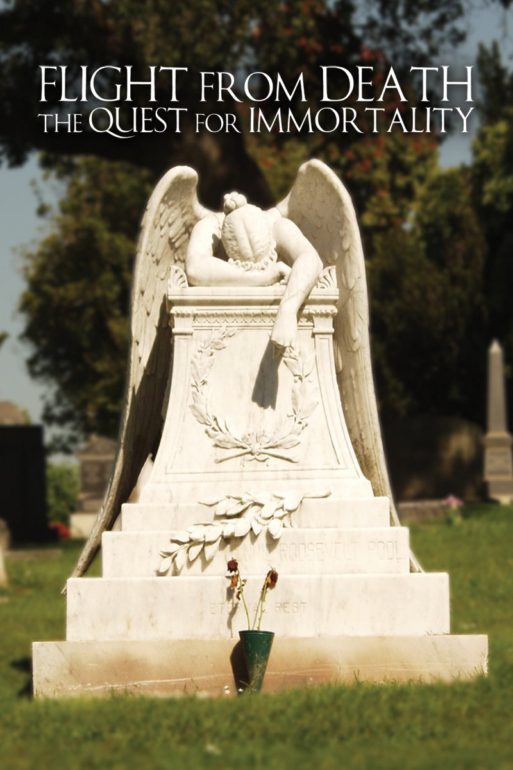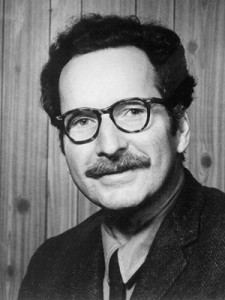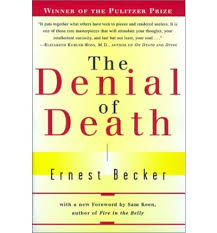 In the documentary film “Flight From Death-The Quest For Immortality,” filmmakers Patrick Shen and Greg Bennick explore the uniquely human cognitive problem of being consciously aware of our own mortality: We are living organisms with the ability to recognize that our drive to survive will ultimately fail.
In the documentary film “Flight From Death-The Quest For Immortality,” filmmakers Patrick Shen and Greg Bennick explore the uniquely human cognitive problem of being consciously aware of our own mortality: We are living organisms with the ability to recognize that our drive to survive will ultimately fail.
The film begins with a series of short interviews with psychotherapists, philosophers, and a cancer patient with a terminal diagnosis talking about the inevitability of death and the human fear of that inevitability. Author and philosopher Sam Keen shakes his finger at the camera in one scene, declaring, “At a gut level, I believe death is unacceptable. I did NOT sign that contract…Death is an insult to our spirit.”
Initially, I was worried that the film was going to be no more than 90-minute long depressing meditation about how terrible it is to live with the knowledge that you are going to die. However, the film takes a positive turn when it introduces the figure of Ernest Becker, cultural anthropologist and Pulitzer prize winning author of “The Denial of Death.” The documentary ends up being an exploration of Becker’s work and a fascinating look at the way consciousness of death influences human behavior.
Becker posits that culture is a collective fabrication of a set of beliefs about the nature of reality that we develop to help us cope with our death anxiety. Culture, therefore, functions as a symbolic defense mechanism against our awareness of our own mortality. Cultural conceptions of reality help us create order and provide a sense of security. To solve the existential problem of death anxiety, we use the same intellectual skills that caused the problem in the first place — our intelligence and our ability to think symbolically.

Ernest Becker
(Credit: ernestbecker.org)
Becker explains that the fight-or-flight response is “the response of animals to acute stress:” The human flight response to death anxiety manifests in death denial. We attempt to “fight death” via elixirs, rituals, anti-aging systems, fountains of youth, pharmaceuticals and dietary approaches, but these are all doomed to fail. We cannot defeat death.
Becker further posits that death denial is central to the cultural belief systems we construct. Culture gives us meaning and helps us contextualize ourselves. Every culture, for example, has some way of accounting for the origins of the universe. Humans have a dualistic nature consisting of a physical self that exists in the world of objects and a symbolic self that lives in the symbolic world of meaning. According to Becker, humans transcend the existential problem of mortality by focusing on our symbolic selves. Perhaps we can’t live forever in the physical world, but we can turn towards identification with our cultural symbols to achieve immortality. If we believe ourselves to be part of something bigger than ourselves — something we believe is immortal — we achieve symbolic immortality.

Credit: bookdepository.com
“Flight From Death” also touches on Becker’s theory that death anxiety is a primary motivator for human violence and aggression. It argues that, in order to preserve the illusion of a particular version of immortality, we must annihilate competing ideas from other cultures. The most protracted armed conflicts have been ideological conflicts, motivated by our desire to bolster our own version of reality. Bolstering ones own version of reality apparently requires obliterating people that present alternative worldviews. The documentary highlights a series of lab experiments that show that, when subjects were reminded of death, they tended to become hostile towards those perceived as being “different” while reacting more positively towards those perceived to be “the same.”
I found this film fascinating. It was a comprehensive introduction to the ideas of highly regarded cultural anthropologist on some of the most interesting and important topics we wrestle with as humans. The tone of the film is pretty academic, with a lot of footage of talking-head scholars interspersed with stock library footage of historical events that are of dubious relevance to the ideas being discussed. If you’re looking for a comforting meditation on death and dying, look elsewhere. If you’re a fan of social anthropology and are partial to philosophical explorations of human behavior, this is an hour and a half well spent.

 ”Flight From Death-The Quest For Immortality” by Patrick Shen
”Flight From Death-The Quest For Immortality” by Patrick Shen


 Having an Estate Plan Is Essential – So Is Discussing It With Your Children
Having an Estate Plan Is Essential – So Is Discussing It With Your Children
 The Healing Sound of Singing Bowls
The Healing Sound of Singing Bowls
 “Summons” by Aurora Levins Morales
“Summons” by Aurora Levins Morales














